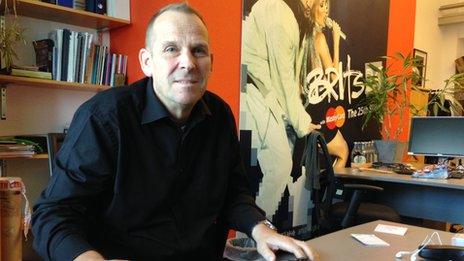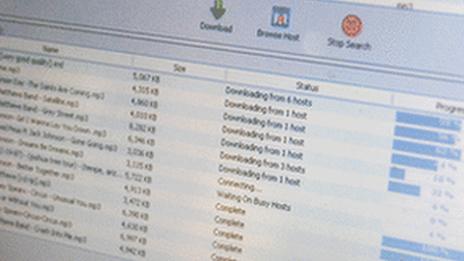Newsbeat meets the team tackling music piracy online
- Published

The BPI's anti-piracy unit is based as the organisation's headquarters in London
In an office overlooking the river Thames, a small team of people is working to protect the UK music industry from piracy.
The BPI's (British Phonographic Industry) anti-piracy unit tracks sites hosting and linking to illegal content.
The team is not concerned with people downloading tracks at home.
"Our focus is on the people who want to make profit," said John Hodge, head of internet investigation.
"Whether it's streaming or downloading, there's somebody there facilitating this and making money out of it."

John Hodge is head of internet investigation at the BPI
Due to the sensitive nature of their work the five team members asked to stay anonymous.
Their work reflects the different ways people listen to music.
"We look at apps and we have to take action sometimes against apps and get them taken down," said Mr Hodge.
"We work to analyse apps and put a good case to Android and Apple that this is a majorly infringing app."
Find out what artists including Jessie J, Naughty Boy and Angel Haze say about music piracy
'Clear knowledge'
The BPI estimates that piracy costs the UK music industry around £200 million per year.
Much of the anti-piracy unit's work is geared towards getting illegal sites removed from online search results.
Google's transparency report shows the BPI has requested the removal of 35,401,959 URLs so far this year.
But the music industry would like the internet giant to do more.
"It's just not right," said BPI chief executive Geoff Taylor.
"Once they have clear knowledge that a particular site is illegal, it is hard to justify that they continue to put that site above Amazon, above iTunes, above Spotify."
Google said that it works "extremely hard" to tackle piracy.

Brit award statues line the corridor leading to the BPI's anti piracy unit
Stephen Rosenthal, communications and public affairs manager for Google UK, said: "We react to removal requests faster than any other search engine.
"We receive around four million per week and we deal with them in around six hours on average."
'Against censorship'
The BPI has successfully gained high court orders forcing UK internet service providers to block certain sites.
But proxy services frequently provide ways for users to get around the bans.
Drastik, who wouldn't give his real name, is a Toronto-based proxy provider. He doesn't think blocking sites will work.
"There's always going to be workaround, ways to circumvent things like this and there's always going to be people that are against censorship that are going to fight against these blocks."
The British music industry expects to make more money from streaming and downloads than physical sales for the first time this year.
John Hodge is confident his team are well placed to tackle the continuing challenge of piracy.
"We are very focused. They're all very aware of how the internet works and they're all big music fans. We get very good results."
Follow @BBCNewsbeat , externalon Twitter
- Published15 October 2013

- Published14 October 2013

- Published11 September 2013

- Published13 August 2013

- Published19 July 2013

- Published28 May 2013
